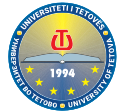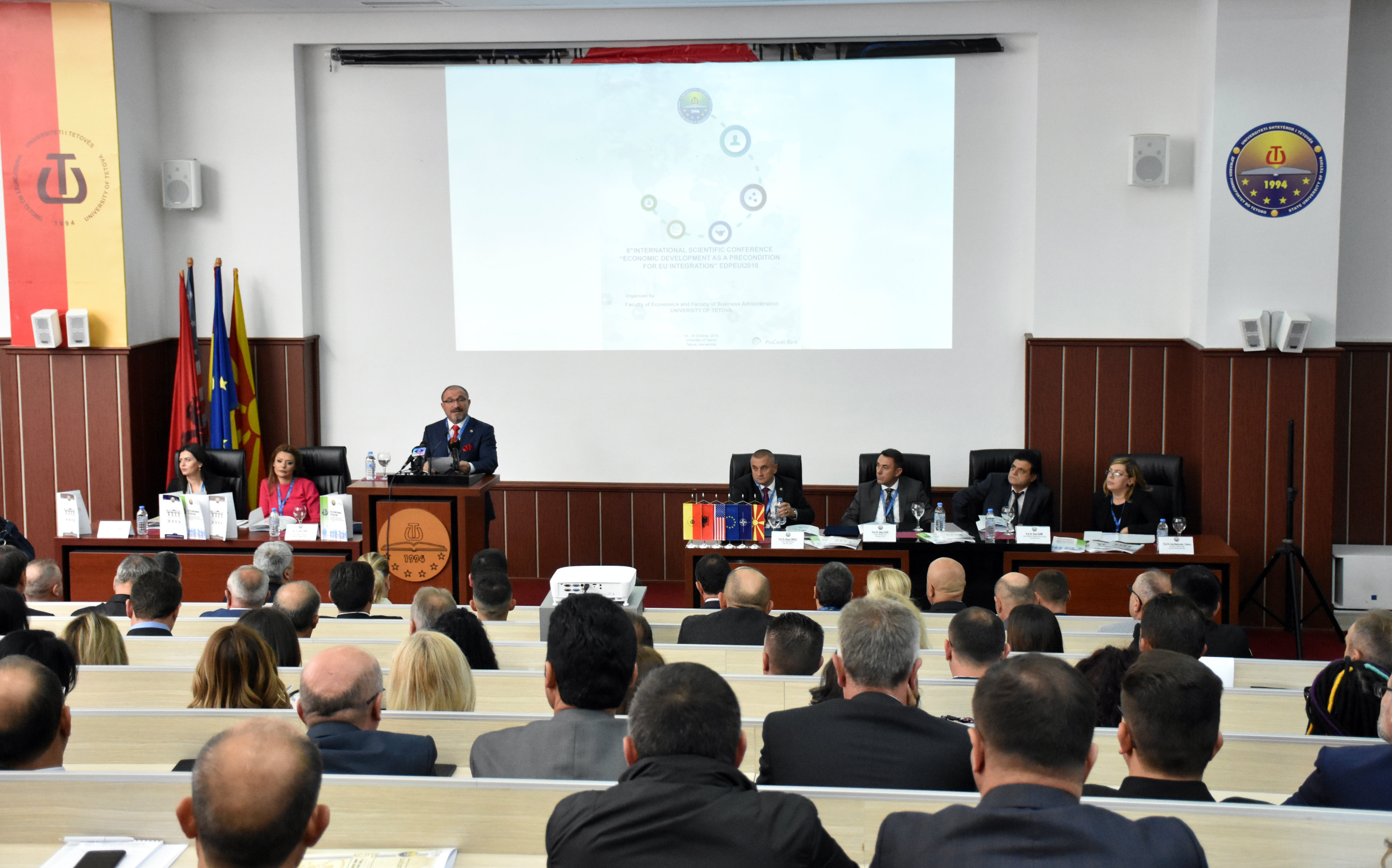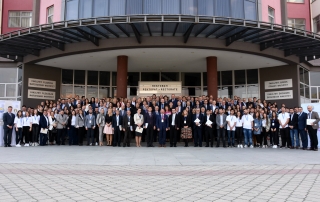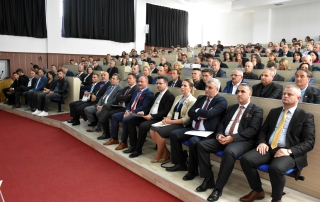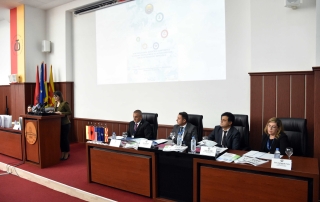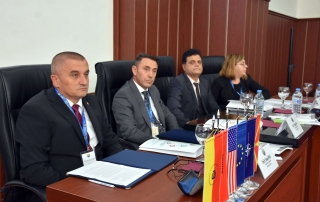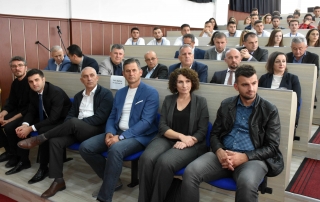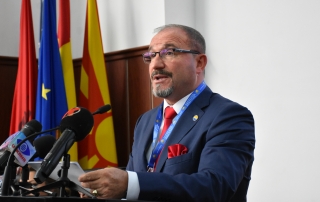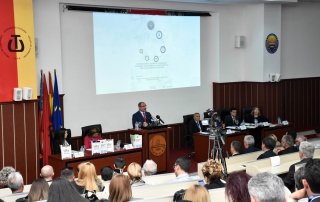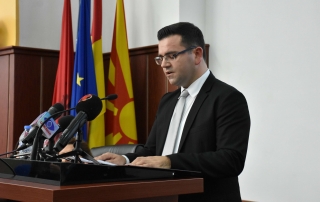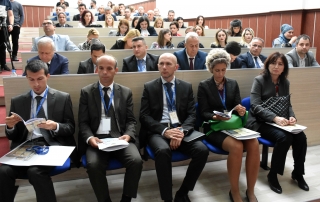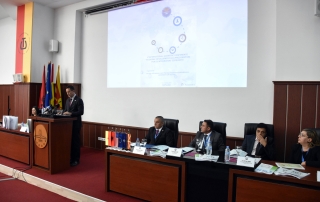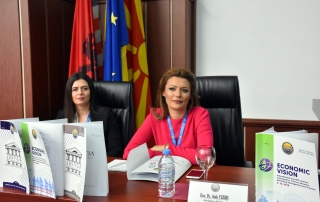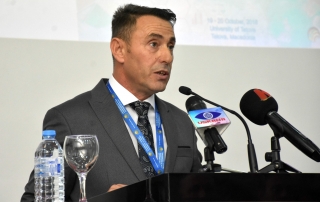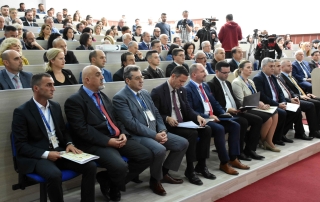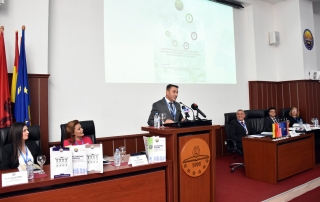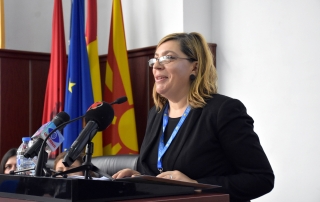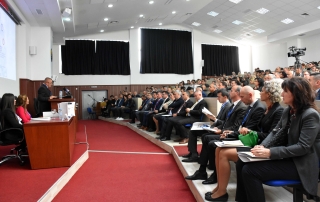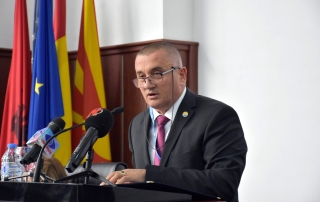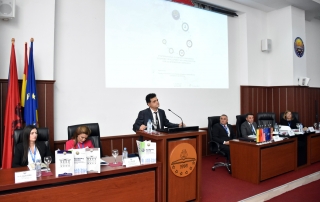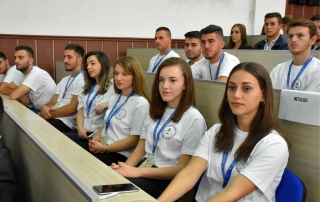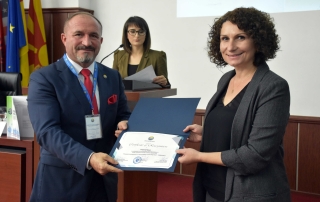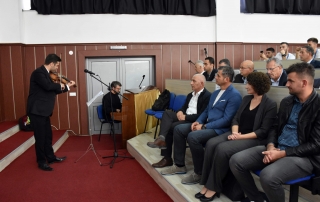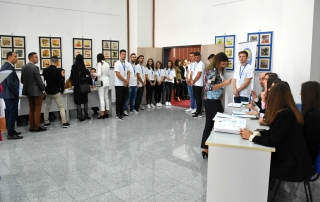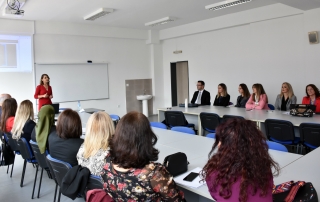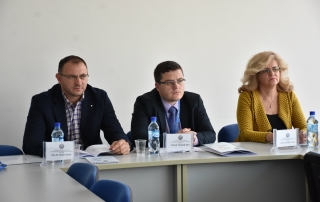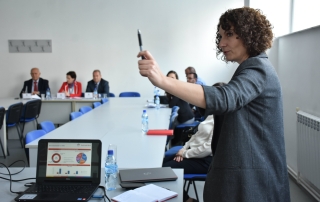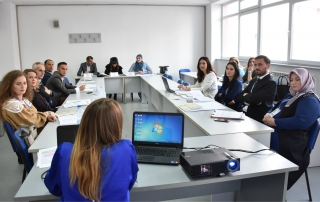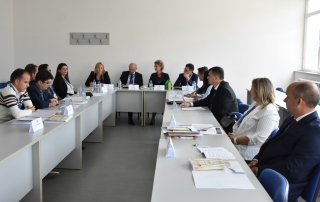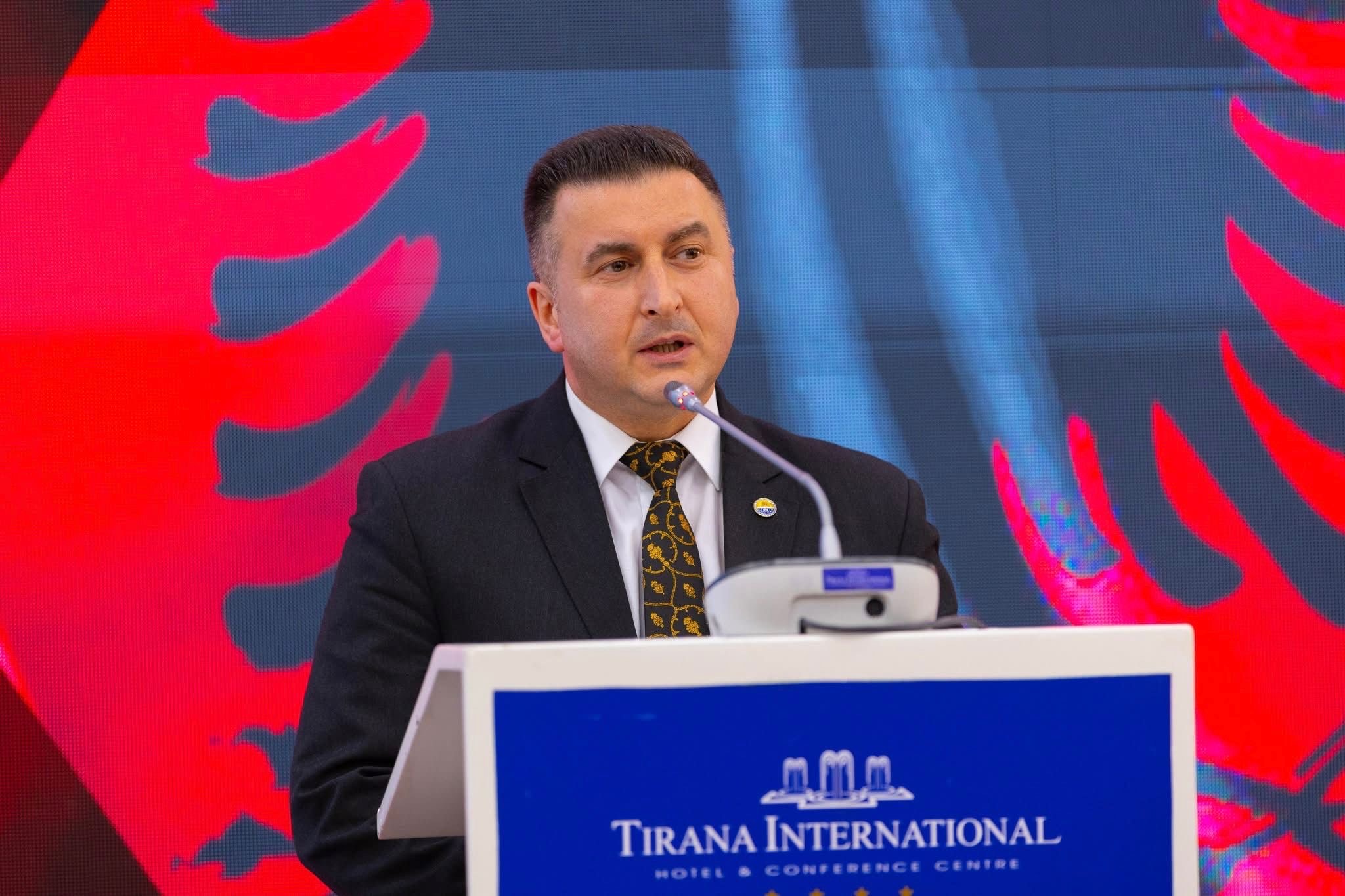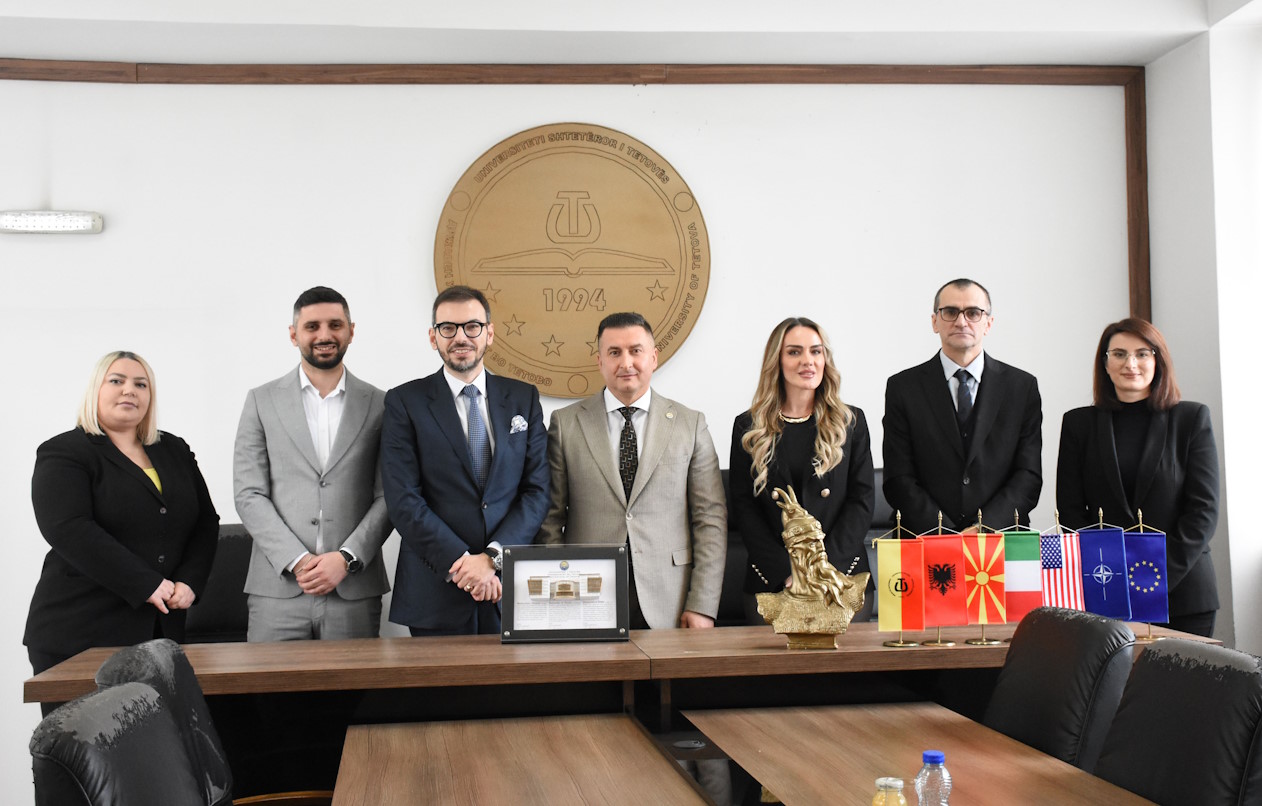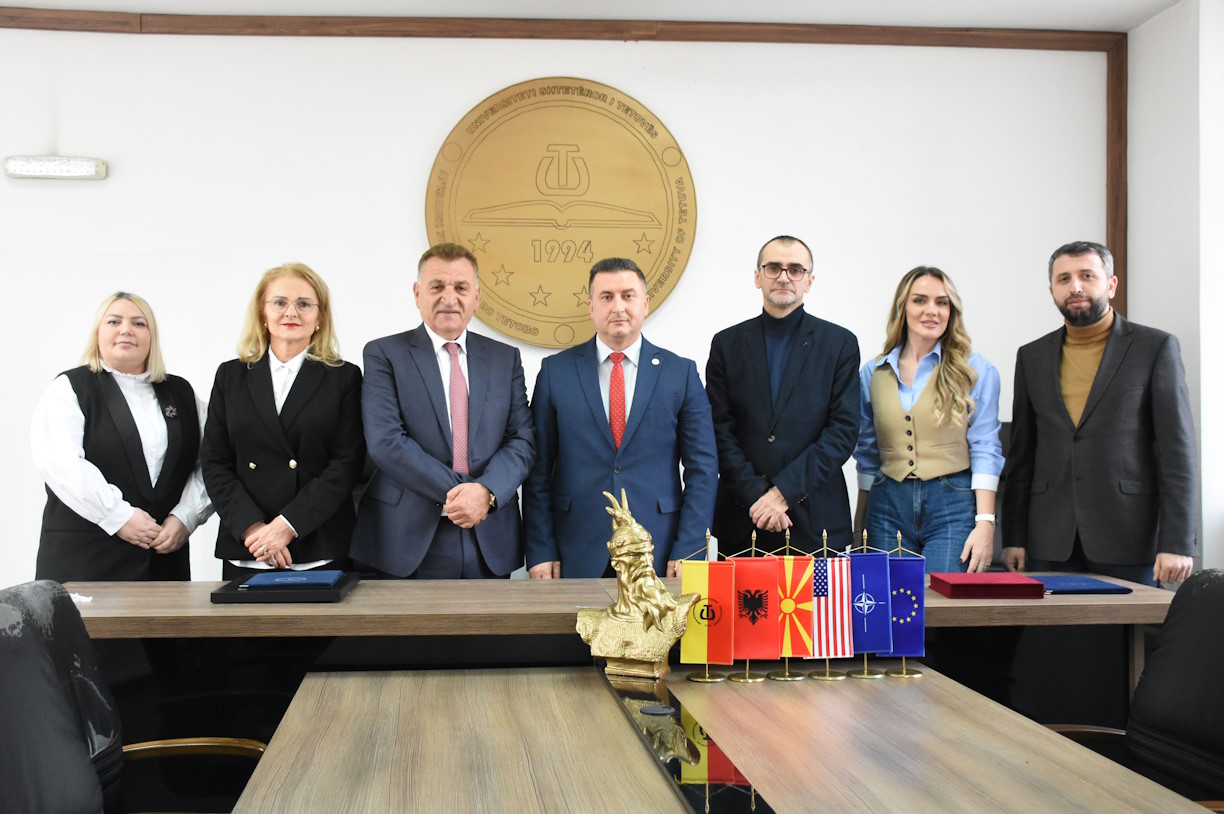“Economic development as a precondition for EU integration” and “The Rule of Law and Civil Society” were the topics of two international scientific conferences, which held the proceedings at the University of Tetova.
Scientific researches from the fields of economy, business, tourism, administration etc, at the 6th international conference organized by the Faculty of Economics and Faculty of Business Administration presented their papers on economic development in our country, the growth of foreign trade and investment as well as on the benefits that our country will have with the membership in Euro-Atlantic structures. While scientific researchers from the fields of justice, media, civil society, etc, at the 5th international conference, organized by the Faculty of Law of the University of Tetova in cooperation with “Iustinianus Primus” Faculty of Law of Ss. Cyril and Methodius University, discussed about reforms in the justice system, the role of media and civil society.
Rector of the University of Tetova, Prof. Dr. Vullnet Ameti, at the opening of conferences’ proceedings, said that the topics dealt with in these conferences are very current as we all are witnessing the great developments that take place in our country, endless debates in relation to emerging events, public expectations for the future of the country and its orientation towards progressive aspirations. According to him, universities, as the most representative institutions of society, certainly cannot remain indifferent in these situations, all the more that they have the professional competence, the proper preparation, the necessary cadres and the clear vision to deal with various issues. “I believe that the editorial boards of the respective conferences, with the selection of these current topics, will debate scientifically all the issues facing the rule of law today and the alternatives of accelerating the strengthening of the economy. Referring to the first topic, we consider that an important role in encouraging institutions respecting and enforcing laws, realizing their commitments, further deepening of institutional reforms that promote participation and cooperation, belongs to the civil society. But this happens in the states with a functional democracy, where civil rights and civil society are respected to participate in decision-making processes, access to public information, the right to propose laws, the right to freedom of speech and many other rights guaranteed by the constitution. Despite the abovementioned lack of standards, in our country and not only civil society has contributed to the advancement of many processes, both in the service delivery sector, mobilization of local communities, protection of groups in need, transparency of institutions and strengthening of their capacities” – said Prof. Dr. Vullnet Ameti.
He further added that the international community calls for deep reforms, especially in the field of justice, which would have direct effects over other relevant sectors as well, including the civil society. “Regarding the economic development, rules are also required to ensure that economic competition is achieved in equal conditions, within a competitive system worthy of a democratic society. Our country and our neighbors in the Western Balkans region are oriented towards Euro-Atlantic integration, but to embrace the European values, the consolidated democracy, and the rule of law, we must all engage strongly, give our contribution as a civil society, as educational institutions, and as a progressive society of the 21st century” – said among others the UT Rector, Prof. Dr. Vullnet Ameti.
The Minister for Foreign Investments of the Government of the Republic of Macedonia, Prof. Dr. Bardhyl Dauti, said that Macedonia’s most viable option and fairer determination remains the integration into the European Union and NATO. “Euro – Atlantic integrations are a strategic objective of the Republic of Macedonia as a guarantee for security, peace, stability and development. Integration into the EU means a larger market, greater competition, more opportunities, and greater security for all citizens. For countries like Macedonia, the question shouldn’t be whether to integrate into the EU and NATO, but how to accelerate this process”- said Minister Prof. Dr. Bardhyl Dauti.
The President of the Economic Chamber of Northwestern Macedonia highlighted particularly the Global Competitiveness Index report, which was published a few days ago by the World Economic Forum, and which states that the current state in the sphere of the economy but also in other areas is not favorable in the Republic of Macedonia. “Another fact of concern about this report is that country’s institutions are ranked in the 85th place, which is an indication that business is struggling because of institutional stagnation. Therefore, we as a Chamber of Commerce, consider that, in order to achieve our goals as a country and as a business sector, policy makers should also undertake concrete initiatives for the development and progress of the state to reach the level of the EU member states.” – stated Mr. Nebi Hoxha.
Assessments on the importance and topics of the sessions of these conferences were also given by the Dean of the Faculty of Law, Prof. Dr. Qebir Avziu, dean of the Faculty of Economics, Prof. Dr. Raman Ismaili, and the Dean of the Faculty of Business Administration, Prof. Dr. Naser Rahimi. They were also satisfied with the editorial boards of the international scientific journals, which are published by the respective faculties of our University, the “Economic Vision” of the Faculty of Economics, which today inaugurated the 5th edition, and “Justicia” of the Faculty of Law, which promotes the 4th edition. On behalf of “Ss. Cyril and Methodius” University, the organization of these conferences was welcomed by the Vice-Dean of “Iustinianus Primus” Law Faculty, Prof. Dr. Irena Rajcinovska Pandeva.
Scientific researches from the fields of economy, business, tourism, administration etc, at the 6th international conference organized by the Faculty of Economics and Faculty of Business Administration presented their papers on economic development in our country, the growth of foreign trade and investment as well as on the benefits that our country will have with the membership in Euro-Atlantic structures. While scientific researchers from the fields of justice, media, civil society, etc, at the 5th international conference, organized by the Faculty of Law of the University of Tetova in cooperation with “Iustinianus Primus” Faculty of Law of Ss. Cyril and Methodius University, discussed about reforms in the justice system, the role of media and civil society.
Rector of the University of Tetova, Prof. Dr. Vullnet Ameti, at the opening of conferences’ proceedings, said that the topics dealt with in these conferences are very current as we all are witnessing the great developments that take place in our country, endless debates in relation to emerging events, public expectations for the future of the country and its orientation towards progressive aspirations. According to him, universities, as the most representative institutions of society, certainly cannot remain indifferent in these situations, all the more that they have the professional competence, the proper preparation, the necessary cadres and the clear vision to deal with various issues. “I believe that the editorial boards of the respective conferences, with the selection of these current topics, will debate scientifically all the issues facing the rule of law today and the alternatives of accelerating the strengthening of the economy. Referring to the first topic, we consider that an important role in encouraging institutions respecting and enforcing laws, realizing their commitments, further deepening of institutional reforms that promote participation and cooperation, belongs to the civil society. But this happens in the states with a functional democracy, where civil rights and civil society are respected to participate in decision-making processes, access to public information, the right to propose laws, the right to freedom of speech and many other rights guaranteed by the constitution. Despite the abovementioned lack of standards, in our country and not only civil society has contributed to the advancement of many processes, both in the service delivery sector, mobilization of local communities, protection of groups in need, transparency of institutions and strengthening of their capacities” – said Prof. Dr. Vullnet Ameti.
He further added that the international community calls for deep reforms, especially in the field of justice, which would have direct effects over other relevant sectors as well, including the civil society. “Regarding the economic development, rules are also required to ensure that economic competition is achieved in equal conditions, within a competitive system worthy of a democratic society. Our country and our neighbors in the Western Balkans region are oriented towards Euro-Atlantic integration, but to embrace the European values, the consolidated democracy, and the rule of law, we must all engage strongly, give our contribution as a civil society, as educational institutions, and as a progressive society of the 21st century” – said among others the UT Rector, Prof. Dr. Vullnet Ameti.
The Minister for Foreign Investments of the Government of the Republic of Macedonia, Prof. Dr. Bardhyl Dauti, said that Macedonia’s most viable option and fairer determination remains the integration into the European Union and NATO. “Euro – Atlantic integrations are a strategic objective of the Republic of Macedonia as a guarantee for security, peace, stability and development. Integration into the EU means a larger market, greater competition, more opportunities, and greater security for all citizens. For countries like Macedonia, the question shouldn’t be whether to integrate into the EU and NATO, but how to accelerate this process”- said Minister Prof. Dr. Bardhyl Dauti.
The President of the Economic Chamber of Northwestern Macedonia highlighted particularly the Global Competitiveness Index report, which was published a few days ago by the World Economic Forum, and which states that the current state in the sphere of the economy but also in other areas is not favorable in the Republic of Macedonia. “Another fact of concern about this report is that country’s institutions are ranked in the 85th place, which is an indication that business is struggling because of institutional stagnation. Therefore, we as a Chamber of Commerce, consider that, in order to achieve our goals as a country and as a business sector, policy makers should also undertake concrete initiatives for the development and progress of the state to reach the level of the EU member states.” – stated Mr. Nebi Hoxha.
Assessments on the importance and topics of the sessions of these conferences were also given by the Dean of the Faculty of Law, Prof. Dr. Qebir Avziu, dean of the Faculty of Economics, Prof. Dr. Raman Ismaili, and the Dean of the Faculty of Business Administration, Prof. Dr. Naser Rahimi. They were also satisfied with the editorial boards of the international scientific journals, which are published by the respective faculties of our University, the “Economic Vision” of the Faculty of Economics, which today inaugurated the 5th edition, and “Justicia” of the Faculty of Law, which promotes the 4th edition. On behalf of “Ss. Cyril and Methodius” University, the organization of these conferences was welcomed by the Vice-Dean of “Iustinianus Primus” Law Faculty, Prof. Dr. Irena Rajcinovska Pandeva.
